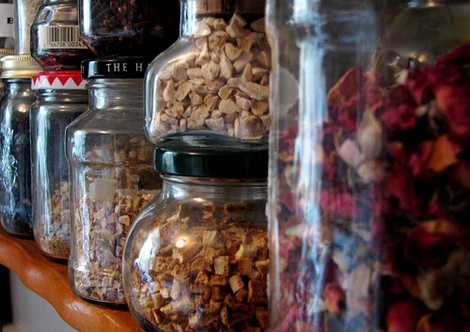Herbal Hair Care – Useful Hints and Recipes for Home-Made Shampoos

Herbal, home-made hair care products are gaining an increasing popularly among many health-conscious people. Not only are home-prepared shampoos, conditioners, rinses, and hair loss remedies more natural and lack synthetic chemicals or other undesirable ingredients, they are also more beneficial and can target specific scalp and hair problems with a high degree of safety and efficiency.
An all-natural, home-made herbal shampoo is easy to prepare, especially if you can obtain an unscented, hard white soap (castile soap is an excellent choice), or pure-grade borax. The following two recipes for wonderfully-scented, hair-strengthening shampoos should become your first hair care choice, particularly if you suffer from hair loss, weakened hair, scalp lesions, or related problems.
Natural Shampoo with Bouncing Bet:
Bouncing Bet, also known under its old folk names Lady’s-Washbowl and Soapwort, is rich in natural cleansing substances saponins and has a natural ability to produce a soap-like lather. The early Brits, as well as new-coming American colonists, used this herb on their skin and hair to keep them clean and healthy. Bouncing Bet is also known for its strong medicinal properties – as a diuretic, expectorant, and laxative. Traditional doctors noted that Bouncing Bet could treat various skin eruptions, such as dermatitis, eczema, psoriases, and irritated scalp. A natural shampoo with Bouncing Bet can help eliminate persistent scalp problems, itch, skin irritations, and related hair shedding.
In order to prepare this shampoo at home, you will need about 3 tablespoons dried Bouncing Bet herb, 2 tablespoons dried flowers of chamomile, and 1 teaspoon borax (available in most drugstores). Place the herbal mixture and borax in a thick ceramic jar, add 2 cups boiling water, stir well, and steep until cool. Cover tightly, shake the container so that all ingredients mix well, and let the covered jar stand overnight, or longer. When ready, shake the jar again, strain the liquid, and use this healing shampoo to naturally clean your hair whenever needed.
Castile Shampoo with Mixed Herbs:
Another wonderful hair cleanser is castile herbal shampoo. The basic castile soap in this recipe (either powdered, or flaked from a bar) is made from pure olive oil. It cleans well, rinses off easily, and produces a gentle therapeutic effect on your scalp and hair. An addition of various herbs will make this shampoo a superb hair medicine. A wide variety of helpful herbs, natural aromatic ingredients, or healing essential oils can be added, including stinging nettle, southernwood, aloe vera, lemon peel, tea tree oil, rosemary oil, and so forth. A choice of specific herbs or oils will depend on a particular hair condition you want to heal or correct.
For the basic recipe, take ¼ cup dried chamomile flowers, if your hair is blond, or substitute for dried sage leaves, if your hair is dark-coloured. Add several tablespoons each of dried rosemary leaves, peppermint, stinging nettle, or other herbs, if desired. Put the herbal mixture into a clean, heavy saucepan. Add 3 cups distilled water, bring to boil, and then simmer for 15 minutes. Strain the liquid into a bowl, put in 2 ounces castile soap, and simmer over low heat until the soap dissolves, stirring the mixture with a wooden spoon. Let your wonderful home-made shampoo cool – its consistency should be light yet creamy. Then, add in several drops of your favourite essential oil – the best options are hair-friendly eucalyptus, tea tree, or peppermint oils. At the end, mix in 2 tablespoons vodka, brandy, or cognac. Stir well, pour the ready shampoo into a jar with a tight lid, and let stand for several days. Use as your basic medicinal shampoo. Enjoy!
Christiana Roberts
Posted on May 13, 2008
Filed Under Hair Care
Comments
One Response to “Herbal Hair Care – Useful Hints and Recipes for Home-Made Shampoos”
Leave a Reply

Could you please tell me, how can make castile soap .
I want to make herbal shampoo by herbs such as henna, Lemon grass, Mint, Hibiscus, Neem. can you tell me, what is the mean of “Hibiscus”,what is this?
what volume and how can i mixed it . please tell me soon.
Thanks
rana.